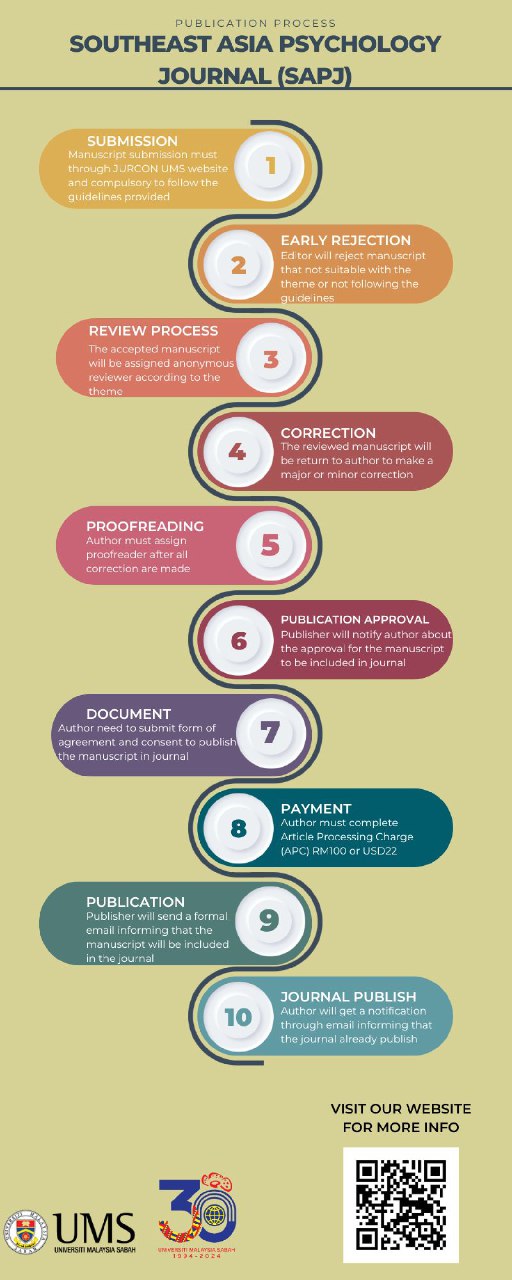THE RELATIONSHIP BETWEEN PERFECTIONISM, RUMINATION, AND ACADEMIC PROCRASTINATION AMONG CHINESE COLLEGE STUDENTS
DOI:
https://doi.org/10.51200/sapj.v13i1.6249Keywords:
Chinese College Students, Perfectionism, Rumination, Academic ProcrastinationAbstract
Academic procrastination has a significant impact on college students' academic performance and future employment prospects, making it an important issue to address. This study aimed to examine the effects of perfectionism and rumination on academic procrastination among college students. Additionally, the study explored the mediating role of rumination in the relationship between perfectionism and academic procrastination. A total of 460 students from four representative universities in Southwest China were surveyed using The Chinese Frost Multidimensional Perfectionism Scale (CFMPS,1991) Rumination Scale (RRS), and Academic Procrastination Scale (API). The scales demonstrated good reliability and validity. The study analyzed correlations and regression relationships among the variables, and also investigated the mediating effect of rumination. The results indicated that perfectionism did not directly affect students' academic procrastination; instead, it influenced procrastination through rumination. Rumination fully mediated the relationship between perfectionism and academic procrastination.
References
Fei Zi Xu Zhou. (2006). The Chinese Frost Multidimensional Perfectionism Scale: An Examination of Its Reliability and Validity. Chinese Journal of Clinical Psychology. 6.
Ferrari, J. R., Johnson, J. L., & McCown, W. G. (1995). Procrastination and task avoidance: Theory, research, and treatment. Plenum Press.
Flett, G. L., & Hewitt, P. L. (2020). Reflections on Three Decades of Research on Multidimensional Perfectionism: An Introduction to the Special Issue on Further Advances in the Assessment of Perfectionism. Journal of Psychoeducational Assessment, 38(1), 3–14. https://doi.org/10.1177/0734282919881928
Frost, R.O., Heimberg, R. G., Holt, C. S., Mattia, J. I., & Neubauer, A. L. (1993). Comparison of two measures of perfectionism. Personality and Individual Differences, 14(1), 119–126. https://doi.org/10.1016/0191-8869(93)90181-2
Frost, R. O., Marten, P., Lahart, C., & Rosenblate, R. (1990). The dimensions of perfectionism. Cognitive Therapy and Research, 14(5), 449–468. https://doi.org/10.1007/BF01172967
Gao, K., Zhang, R., Xu, T., Zhou, F., & Feng, T. (2021). The effect of conscientiousness on procrastination: The interaction between the self-control and motivation neural pathways. Human Brain Mapping, 42(6), 1829–1844. https://doi.org/10.1002/hbm.25333
Hewitt, P. L., & Flett, G. L. (1991). Perfectionism in self and social contexts: Conceptualization, assessment, and association with psychopathology. Journal of Personality and Social Psychology, 60(3), 456-470.
Lee, E. (2005). The relationship of motivation and flow experience to academic procrastination in university students. The Journal of Genetic Psychology, 166(1), 5-15.
Li, L., Gao, H., & Xu, Y. (2020). The mediating and buffering effect of academic self-efficacy on the relationship between smartphone addiction and academic procrastination. Computers & Education, 159, 104001. https://doi.org/10.1016/j.compedu.2020.104001
Liang, Ys. (2000). Research on college achievement goals, attribution methods and academic self-efficacy. Master's dissertation, Wuhan: Central China Normal University.
Liao, Yg. (2011). The moderating effect of self-efficacy on the relationship between learning values and learning input. Journal of Ningbo University: Educational Science Edition, 33 (5), 50-54.
Liu, G., Cheng, G., Hu, J., Pan, Y., & Zhao, S. (2020). Academic Self-Efficacy and Postgraduate Procrastination: A Moderated Mediation Model. Frontiers in Psychology, 11. https://www.frontiersin.org/articles/10.3389/fpsyg.2020.01752
Liu, Y, Liu, Zh, Duan, Hz, Chen, Gx, & Liu, Wj (2022). The effect of insecure attachment on academic delay: The intermediary role of perfectionism and rumination. Psychological technology and applications, 10(7), 407-414.
Nolen-Hoeksema, S. (1991). Responses to depression and their effects on the duration of depressive episodes. Journal of Abnormal Psychology, 100(4), 569-582.
Nolen-Hoeksema, S., & Morrow, J. (1993). Effects of rumination and distraction on naturally occurring depressed mood. Cognition and Emotion, 7(6), 561–570. https://doi.org/10.1080/02699939308409206
Solomon, L. J., & Rothblum, E. (2012). Procrastination Assessment Scale—Students [dataset]. https://doi.org/10.1037/t09250-000
Solomon, L. J., & Rothblum, E. D. (1984). Academic procrastination: Frequency and cognitive-behavioral correlates. Journal of Counseling Psychology, 31(4), 503–509. https://doi.org/10.1037/0022-0167.31.4.503
Steel, P., & Klingsieck, K. B. (2016). Academic Procrastination: Psychological Antecedents Revisited. Australian Psychologist, 51(1), 36–46. https://doi.org/10.1111/ap.12173
Steinert, C., Heim, N., & Leichsenring, F. (2021). Procrastination, Perfectionism, and Other Work-Related Mental Problems: Prevalence, Types, Assessment, and Treatment—A Scoping Review. Psychiatry, 12. https://www.frontiersin.org/articles/10.3389/fpsyt.2021.736776
Stoeber, J., Damian, L. E., & Madigan, D. J. (2017). Perfectionism: A motivational perspective. In The psychology of perfectionism. Routledge.
Stoeber, J., & Otto, K. (2006). Positive conceptions of perfectionism: Approaches, evidence, challenges. Personality and Social Psychology Review, 10(4), 295-319.
Tangkaiqing et al. (2014). Parenting style and academic delays: The mediating role of the sense of academic self-efficacy. The Chinese Journal of Clinical Psychology, 22(5), 889-892.
Wu, Z. (2015). Giant baby nation: The psychological impact of parental and educational pressures in China. XYZ Publishing.








